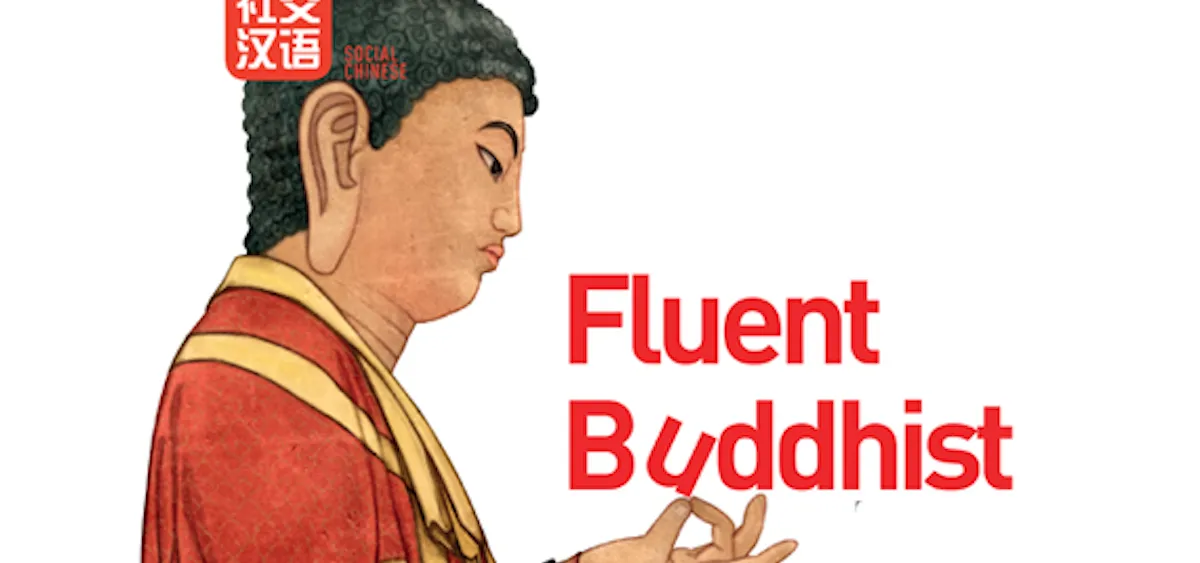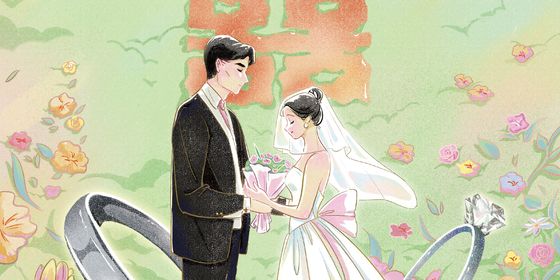How to chinwag like Siddharta himself (in China)
Even if you don’t follow in the ways of the Siddhartha, there’s a lot people can learn from the tenets, language, and culture of Buddhism. Imported into China almost 2,000 years ago, there are 185 million Buddhists in China, and Buddhist vocabulary is deeply ingrained in the Chinese language.
Many words can make you sound more like a Buddhist. When you want to say “stupid”, instead of 愚蠢 (yúchǔn), you should say 愚痴 (yúchī), which makes the word sounds more sympathetic, as if the Buddha’s eyes are casting empathy on the stupidity of humanity. For those on a diet who want to say “I’m determined to lose 10 pounds”, say “我发愿减十磅” (Wǒ fāyuàn jiǎn shí bàng), giving the action a solemn tone. But if there is one Buddhist word you need to learn, it’s 无常 (wúcháng), essential to all Buddhist beliefs. It literally means unpredictable, but in a Buddhist context it means everything will die and nothing is permanent.
My house is going to be torn down.
Wǒ de fángzi yào bèi chāiqiān le.
我的房子要被拆迁了。
That’s how this world is, everything passes away.
Shìshì jiùshì zhème wúcháng a.
世事就是这么无常啊。
I was fired.
Wǒ bèi chǎo le.
我被炒了。
Let it go. It’s just a job. If you feel attached to anything in this ever-changing world, you are fated to suffer.
Fàngxià ba! Zhè zhǐshì gè gōngzuò. Rúguǒ nǐ zhízhuó yú zhège wúcháng de shìjiè shàng de rènhé dōngxi, jiù zhùdìng yào shòukǔ.
放下吧!这只是个工作。如果你执着于这个无常的世界上的任何东西,就注定要受苦。
The word 因果 (yīnguǒ, karma) is another frequently used word because it can be used to explain away all good and horrible in the world. 因果 literally means “causes and results”, but when it is used in a Buddhist context, it indicates a resigned attitude that puts everything in the hands of fate. It is often used together with 报应 (bàoyìng), which means basically the same thing.
Did you see the hit-and-run news? The police have no leads.
Nǐ kànle nà tiáo zhàoshì táoyì de xīnwén ma? Jǐngchá gēnběn zhuābúdào tā.
你看了那条肇事逃逸的新闻吗?警察根本抓不到他。
We are all creatures of our own karma. They will come face to face with their deeds one day.
Wǒmen dōu bēifùzhe zìjǐ de yīnguǒ. Tāmen chízǎo huì zāo dào bàoyìng de.
我们都背负着自己的因果。他们迟早会遭到报应的。
I won the lottery.
Wǒ zhòngjiǎng le.
我中奖了。
It must be karma. You must have done a lot of good things in your last life.
Yīnguǒ a! Nǐ zhè shì shàngbèizǐ xiū lái de fúfen.
因果啊!你这是上辈子修来的福分。
To speak like a more authentic Buddhist, you need to express how you’ve seen through life’s transitory nature; Remember to quote the Diamond Sutra:
All composed things are like a dream,
Or bubbles in a stream.
They vanish like the morning dew,
Or a streak of lightening across the sky.
Yíqiè yǒu wéi fǎ, rú mènghuàn pàoyǐng, rú lù yì rú diàn.
一切有为法,如梦幻泡影,如露亦如电。
If this is too much to take on, just remember 梦幻泡影 and compare everything in your life to it.
My youthful years are floating away like a dream, or bubbles in a stream.
Wǒ de niánqīng suìyuè xiàng mènghuàn pàoyǐng yíyàng liúshì le.
我的年轻岁月像梦幻泡影一样流逝了。
You should also show how, armed with the wisdom of Buddha, you cannot be seduced by the vanity of the material world. In Buddhist terms, the exterior of things is called 色 (sè), the visible form, while the innate nature of all things is 空 (kōng), emptiness. Memorizing this passage from the Heart Sutra and will make you look really insightful:
Form does not differ from emptiness,
Emptiness does not differ from form.
Form is emptiness,
And emptiness is form.
Sè bú yì kōng, kōng bú yì sè. Sè jí shì kōng, kōng jí shì sè.
色不异空,空不异色。色即是空,空即是色。
In this example, “form is emptiness” is widely used.
I’m so jealous of the Porsche owner who painted his car gold.
Wǒ zhēn xiànmù nàgè kāi jīnsè Bǎoshíjié de rén.
我真羡慕那个开金色保时捷的人。
But remember, all forms are emptiness.
Dàn nǐ bié wàng le, sè jí shì kōng a.
但你别忘了,色即是空啊。
Unlike many other religions, Buddhism does not draw a strict line between the converted and the unconverted. If you consider yourself a potential Buddhist, or are simply interested in Buddhism, then you are more than welcome in any Buddhist community. To address a Buddhist, regardless of that person’s gender or age, you should always call the person 师兄 (shīxiōng, brother) to show reverence. To refer to yourself you should use “末学” (mò xué), which literally translates to “the worst student”. For example, to address a 70-year-old woman whose surname is Li, you should say,
Good day, Brother Li. How do you interpret this passage of the Diamond Sutra?
Li Shīxiōng hǎo. Nín zěnme lǐjiě zhè yí duàn 《jīngāngjīng》?
李师兄好。您怎么理解这一段《金刚经》?
And follow it up with:
Thank you for your teaching.
Mòxué shòujiào le.
末学受教了。
To return a greeting, say “阿弥陀佛” (Ēmítuófó, Amitabha) on all occasions and it will almost never go wrong; it show s humility. Amitabha was a bodhisattva’s name, but in daily conversations, it just means “Buddha bless you” and indicates politeness. It can also be used as an exclamation, similar to “Oh my god!”
Amitabha! I’ve used the sugar instead of salt.
Ēmítuófó! Wǒ bǎ táng dàngzuò yále.
阿弥陀佛!我把糖当做盐了。
If you visit a temple and want to offer incense or get a string of beads, never say “buy” but rather “invite” (请 qǐng). Although you do pay with cash, the blessing that comes entwined with the items is not something any worldly wealth can buy, but only falling to you through humility.
You: May I “invite” a string of Buddhist beads?
Wǒ xiǎng qǐng yī chuàn fózhū.
我想请一串佛珠。
Monk: Amitabha. Our Buddhist beads are all blessed by the abbot. May you come to know infinite righteousness.
Ēmítuófó. Wǒmen zhèlǐ de fózhū dōushì zhùchí kāiguò guāng de, shīzhǔ zhēnshi jiéle shànyuán le.
阿弥陀佛。我们这里的佛珠都是住持开过光的,施主真是结了善缘了。
In more touristy temples, you may want to tactfully reject what the monks want you to “invite”. If you’re really being bothered, reply with these words from the Diamond Sutra, and any further expensive “invitations” are likely to cease.
Patron, “invite” a Buddha statue to your house. His blessings will keep your whole family from illness and disaster.
Shīzhǔ, qǐng zūn fóxiàng huíqù ba, bǎoyòu nǐmen quánjiā wú bìng wú zāi.
施主,请尊佛像回去吧,保佑你们全家无病无灾。
“Should anyone, looking at an image or likeness of the Buddha, claim to know the Buddha and worship him, that person would be mistaken and not knowing the true Buddha.”
“Ruò yǐ sè jiàn wǒ, yǐ yīnshēng qiú wǒ, shì rén xíng xiédào, bùnéng jiàn Rúlái.”
“若以色见我,以音声求我,是人行邪道,不能见如来。”












